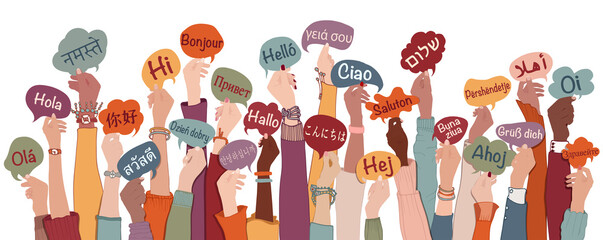Walt Whitman, a famous American poet wrote, “Language is not an abstract construction of the learned or of dictionary-makers. It is something arising out of the work, needs, ties, joys, affections, and tastes of long generations of humanity.”
There is more to language than just a means to communicate with one another. Language is tied to the environment, culture, and identity of a people. The difference between one language and another is not just a matter of vocabulary, syntax, and grammar. There’s also a difference in worldview, philosophy, culture, identity, history, and experience.
While many people may think of language as simply a tool for communication, it’s much more than that. Language is a way of understanding who we are and what our place in the world is. It can be used to divide or unite people, or to create barriers, or bring them together.
Types of Languages

There are many different types of languages. The most common are spoken and written, but there are also computer languages, sign languages, and other forms of communication.
Let’s look at some of the most common forms of language and how they are used.
Spoken Language
Spoken language is the most common form of language. It refers to the way in which people use sounds and words to communicate. Spoken language is used in many different contexts, from casual conversations to formal speeches. People use it every day to express their emotions and thoughts, as well as convey information to others.
For example, when you tell a person “I love you,” depending on who you are talking to, this can mean different things. If you are talking to your significant other, it can mean that you feel a strong romantic attraction toward them. However, if you are saying this to a friend or family member, it may simply be an expression of affection.
The context in which you use spoken language determines how it sounds and what meanings are conveyed.
Written Language
Written language uses letters or symbols to represent sounds. It is considered a system of visual representation and allows people to communicate with each other through writing.
Written languages can be alphabetic or non-alphabetic. An alphabetic system uses letters of the alphabet to represent sounds (e.g., English), while a non-alphabetic system uses symbols that do not correspond directly to sounds (e.g., Chinese).
The use of written language is one of the most significant developments in human history. It provides a way to communicate over great distances, record history, and literature, and transmit information from one generation to the next. It also enables us to share ideas with others and to understand the thoughts and ideas of others.
Written languages have helped people to create complex societies, build empires, develop science and technology, advance medicine, and much more.
Sign Language
Sign language is a type of communication that uses hand signals, gestures, and facial expressions to convey meaning. It is frequently used by people who are deaf or hard of hearing, but it can also be used by anyone who doesn’t have the ability to speak.
The most common form of sign language is ASL (American Sign Language), which originated in the United States in the 19th century and has since spread internationally. Another common form of sign language is BSL (British Sign Language), which is used in the United Kingdom.
Body Language
Body language is a form of nonverbal communication that can be observed in the body movements and gestures of an individual. It’s one of the ways people communicate without using words, and it can convey different meanings depending on a person’s personality or mood.
Body language is often referred to as kinesics, and it involves the use of facial expressions, eye movement, hand gestures, and posture. For example, if your partner gives you a look that could pierce through steel, automatically, you’ll know you messed up.
It’s an interesting and powerful form of communication that can express a range of emotions, including anger and happiness.
Computer Language
Computer language is a set of rules and symbols used to communicate with computers. It is a form of programming that allows people to write instructions for computers to follow.
Computers use computer languages to run software, which are programs that allow computers to perform tasks. This makes it easy for humans to instruct computers to do tasks like performing calculations, playing video games, sending emails, and much more.
Functions of Language
It Connects People
Language connects people in more ways than one. It allows us to share our thoughts and feelings in ways that are more meaningful than speaking or writing.

It allows us to express ourselves in ways that can’t always be done through nonverbal communication. It allows us to share our experiences with each other, and it helps us to understand each other better. It even allows us to connect with people we don’t know but who share our interests.
It Nurtures Connections
As it is, language connects people, and it also nurtures those connections. It allows us to form, build and grow relationships, whether personal or professional.
Language is a way of building social bonds with others, and it’s through it that we make friends, gain trust and even fall in love. It helps us to form connections that may not have been possible without it.
It allows us to form professional bonds by allowing us to connect, communicate and build relationships with work colleagues and clients alike. It’s through language that many people are able to grow their careers or businesses.
It Enables Communication
Language is also important for communication. We use it every day to talk with others, and we rely on it even more when we need to understand someone from a different country or culture.
Without language, we wouldn’t be able to communicate our thoughts, ideas and feelings with each other. We wouldn’t be able to share stories or information, discuss problems or concerns or ask questions or express opinions. It is the ultimate tool for communication.
It Allows Us to Understand Ourselves
Language is also an important part of self-reflection. It allows us to understand who we are and what makes up our identity, which is a key part of personal growth. Through this understanding, we can learn more about ourselves, express ourselves better, and learn how we fit into the world around us.
It Enables Creativity
Language is essential for creativity because it gives you the ability to express your thoughts and ideas in ways that others can understand. It allows you to express your creativity by writing, speaking, or performing.
For example, poets use language to express their creativity through writing or performance. The same goes for musicians, artists, and other creative people. They use language in their work to express their creativity.
It Reflects Culture
Language is also a reflection of culture. It allows people to express themselves in a way that reflects their values and beliefs. It helps them to understand the world around them, both past and present.
It also helps people develop sayings and cultural norms that are unique to their culture. It is important to remember that language is not just spoken or written words; it includes all forms of communication, including gestures and body language.
For example, in Korean culture, people often bow their heads when they greet each other. This is a way to show respect and humility. In the United States, like in many other countries, people shake hands when they greet each other.
The same is true of sayings. People from different cultures have different sayings that they use to express themselves. These sayings can often be difficult for people from other cultures to understand.
In the United States, people often say, “Have a nice day” when they leave each other. In Korea, however, people do not say this. Instead, they might say, “Take care” or “Goodbye for now.” These expressions are similar to the American expression but have different meanings.
Why Language is Powerful
Language has the capability to break barriers, change perceptions, and build relationships. But it can also create conflict, misunderstanding, and division.
The words we choose, the way we use them, and how we speak them can:
Encourage or Discourage
The words you use can encourage or discourage people. The way you speak can make them feel good about themselves or bad about themselves. It can help them to feel confident, or it can make them feel inadequate and frustrated.

It can also change the way they feel about you. If you say something positive to them, then they will think more highly of you and view your relationship more positively. But if you say something negative, then it can have a negative effect on how they see themselves and their relationship with you.
Define our Self-image
Words can help define the way we see ourselves. If you talk about yourself in a negative way, then it will have a negative effect on how others perceive you. However, if you speak positively about yourself and your accomplishments, then people will view you more positively as well. They may even view themselves in a more positive light after hearing some of your positive self-talk
Inspire Others
Inspirational speakers are able to inspire others with their words. They are able to motivate people, give them hope for the future and help them see a better world. It’s not just about what they say; it’s also how they say it.
So the words you use can help inspire another person. For example, if you tell someone that they can achieve anything, then they will believe it. If you say, “I know you can do this,” or “You are strong enough to get through this,” then the person will feel more confident and inspired to achieve it.
However, if you use words like “you have to,” “you should,” “you need to,” etc., then that person will not feel inspired at all. Instead, they will feel demotivated because they will interpret these words as being negative and discouraging.
Indicate our Values and Interests
Words can help you communicate your values and interests to others. For example, if you don’t like people who lie or disrespect others, then you can say: “Honesty and integrity are important to me.” This is a good way to let people know what your values are and how they can help them understand how best to deal with you.
Words can help people know what you value and what you don’t. They can also help people know what you’re interested in. This can help you connect similar interests.
Influence Viewpoints
Words can help you influence the way others view something. For example, if someone doesn’t like the way their life is going, you could help them see things differently by offering a new perspective. Your words can help them see the positive sides of their situation, which might make them feel better about it.
Bring Comfort
Words can be a source of comfort. If you’re sad or upset, it can be encouraging to have someone tell you that they’re there for you. You might not feel like talking about your feelings, but just knowing someone is there for support can help.
The same goes if another person is feeling sad or upset, whether they’re a friend or a stranger, you can help them feel better by offering words of comfort.
Shape our Society
Words can help shape our society. By talking about important issues, such as equality and justice, we can make society more inclusive and fair.
Words can also be used to spread hate, fear, and violence. In the past, we have seen how words can lead to discrimination, racism, and genocide.
Generally speaking, words are a powerful tool. We can use them to make the world a better place, or we can let them tear it apart.
Conclusion
Language is the most important element in communication. It allows us to accomplish simple things like ordering a cup of coffee or complex things like negotiating peace treaties.
Language is what connects us despite our cultural background, it is what makes us who we are, and it is what makes us human. It is the very essence of our existence.


